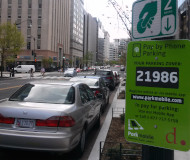8/1/2019
DC Renews Push For Downtown Congestion TaxInspired by New York City, Washington, DC now wants to tax commuters who drive into the city with a congestion charge.

The District of Columbia is moving to finally implement the tax on commuters it has sought for decades. The city's recently adopted 2020 budget provided $500,000 for a study of congestion pricing due on July 1, 2020. City officials, bolstered by efforts to impose a toll on city streets in New York City, are hoping to raise millions with the new charge.
As adopted by the city council, the study is to provide "an analysis of the potential to raise revenue" by putting up toll booths on the bridges across the Potomac River that lead to the city, as well as a count of how much money could be made by tolling streets within the city. The tax would hit most of the people in the city, as three out of four workers in the District commute by automobile, and only 14 percent use Metro or buses.
Virginia motorists who work in DC -- including thousands of congressional staffers -- have no choice but to use one of the six bridges into the capital. As the seat of the federal government, DC is governed by the Home Rule Act through which Congress banned the imposition of a commuter tax. Specifically, it prohibits "any tax on the whole or any portion of the personal income... of any individual not a resident of the District." While the city may interpret that as inapplicable to its tolling plan, Congress has thirty days to veto any act of the DC council. As the city notes, however, Virginia has already begun tolling two of the main roCutes into the city on Interstates 66 and 395. Washington hopes to share in the revenue.
DC has already been testing the concept of raising prices dynamically to take advantage of congestion in parking spots. In January, the city issued a report on its pilot project to use congestion pricing on parking meters in Chinatown. Sold to the public as a way to make parking more available and more convenient -- using an app to feed the meter -- the program proved highly effective at generating revenue. By raising the cost to park at peak periods using electronic parking meters, the city found average rates charged to motorists rose by a third from $2.30 to $3.03.
"For parkDC, however, there was an increase in direct meter revenue of approximately $10,000 per week over the course of the pilot," the city report concluded. "This well surpassed the monthly operational costs and could have subsidized the initial capital costs."


